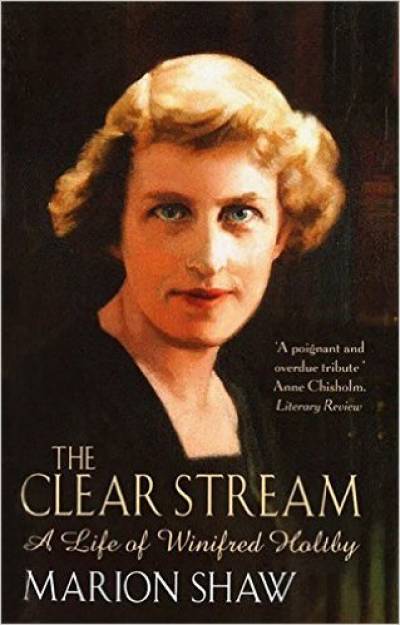 Winifred Holtby (1898–1935) may well be best known for the novel South Riding and a number of other works set in East Yorkshire, but she was also a feminist, socialist and pacifist. She was born into a farming family in East Yorkshire and was educated in Scarborough. She studied at Oxford University, where she met Vera Brittain who portrayed their closeness in Testament of friendship, published in 1940.
Winifred Holtby (1898–1935) may well be best known for the novel South Riding and a number of other works set in East Yorkshire, but she was also a feminist, socialist and pacifist. She was born into a farming family in East Yorkshire and was educated in Scarborough. She studied at Oxford University, where she met Vera Brittain who portrayed their closeness in Testament of friendship, published in 1940.
In the 1920s she wrote a number of moderately successful novels but she was also well respected as a journalist and a literary critic. She was strongly committed to the League of Nations Union and would lecture on the role of the League of Nations in maintaining peace. She would often spend up to four nights a week speaking on behalf of the Union and she also lectured in Central Europe (1924) and South Africa (1926). Her extensive lecture tour of South Africa led her to get an understanding of the growing racism of that country - during her time there, legislation was passed to increase segregation and afford protection to white workers. Black workers could not be referred to as ‘employees’ - Winifred became involved in the development of the black Industrial & Commercial Union (ICU).
Back in England she realised that both trades unions and the Labour Party would not become involved in ‘black politics’ in order to avoid upsetting their white ‘comrades’ in South Africa. Her biographer wrote that ‘the experience of racism…also provided her with the cause that would dominate the rest of her life.’
Winifred was a long-term member of the Union for Democratic Control (UDC) and also joined the Independent Labour Party (ILP) shortly before her death. She had also joined the Labour Party but her experience in South Africa and the behaviour in Labour in office had led her to conclude that Labour had no clear aims.
Winifred was active in the Six Point Group, a feminist campaign group set up in 1921 which worked to promote equality for women. She was a director and contributor to the group’s journal Time & Tide, and campaigning for or writing about equality took up a lot of her time. She wrote many articles for the Manchester Guardian and wrote an important study of Virginia Woolf.
In the 1930s, as the influence of the League of Nations Union declined, she became more involved in the wider peace movement. She contributed an essay (An apology for armourers) to the collection of essays The challenge to death which was edited by Storm Jameson in 1934. At the same time as her involvement in the peace movement, Winifred became increasingly concerned about the rise of fascism in Britain and attended fascist meetings to examine attendees’ mentality. In 1934 she joined the newly established National Council for Civil Liberties (NCCL), an organisation which was set up to counter moves towards the encroachment of the liberty of the citizen.
Two events after her death in 1935 acted to increase the memory of Winifred Holtby with the first being that Vera Brittain, as her literary executor, ensured that South Riding was published in 1936. This became her best-known work and was subsequently serialised for television.
Secondly, in 1940 Vera Brittain wrote Testament of friendship which was a celebration both of her life with Winifred and of female friendships generally. Marion Shaw, Winifred’s biographer wrote that ‘the friendships of women…have usually been not merely unsung, but mocked, belittled and falsely interpreted.’
Although these two works cemented the reputation of Winifred Holtby they have also served to overshadow her commitment to the peace movement, anti-racism, socialism and feminism. In an obituary written in 1935 her fellow novelist and friend Phyllis Bentley wrote of Winifred that it was ‘furnished in her person a brilliant example of what the emancipation of women (for which she cared so much) may be expected to contribute to human achievement.’
The Working Class Movement Library has a copy of Testament of friendship by Vera Brittain [P32], Holtby’s 1934 work Women [E19] and South Riding [C27]. There is also a copy of the biography by Marion Shaw, The clear stream: a life of Winifred Holtby [JS52].
In addition, there are a large number of works relating to pacifism, feminism and anti-racism to come in and read.
